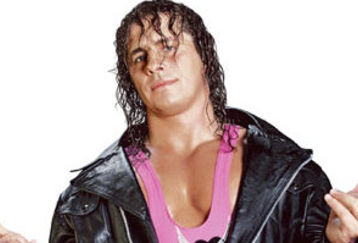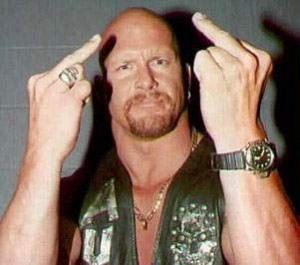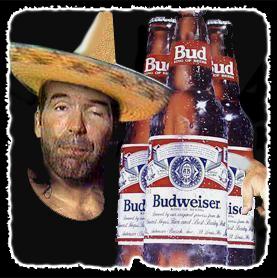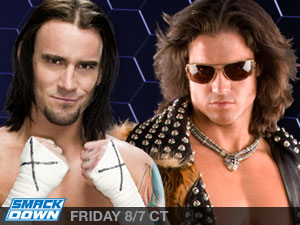WCW Is Back And Its New Name Is TNA
Earlier this month, something happened in the world of professional wrestling that hasn't been seen in something like a decade. Two competing wrestling companies actually went head-to-head with their television programming on a Monday night.
For one night in January 2010, the "Monday Night Wars" of the 1990's were back. But wait — it gets even better. Between the two Monday night wrestling shows — WWE's
Monday Night Raw and TNA's
Impact — the names involved read like some kind of sports entertainment time warp.
TNA's three-hour extravaganza not only marked the return of Hulk Hogan, but also names like Ric Flair, Eric Bischoff, Kevin Nash, Scott Hall, Sean "X-Pac" Waltman, and the Nasty Boys.
 Raw
Raw countered with the return of Bret "Hitman" Hart, who hasn't been seen in a WWE ring since Vince McMahon screwed him out of the world championship twelve years ago in a rare real-life incident fans still refer to as the "Montreal Screwjob." It has long since gone on to become the stuff of legend among those who follow the soap opera for men that is pro-wrestling. Most insiders also believe Hart's return will lead to a scripted final chapter to the "Montreal Screwjob" with McMahon which will play out at this year's
Wrestlemania pay-per-view.

What makes all of this most interesting however, is that if you blinked for a second — not to mention overlooked the fact that guys like Scott Hall look quite a bit worse for their wear these days — you'd almost swear it was the mid-nineties again.
For those unfamiliar, perhaps a brief history lesson is in order here.
During the 90's, pro-wrestling enjoyed a brief period of unprecedented mainstream success, that was driven mostly by the very heated and intense competition between the two primary national wrestling promotions.
Vince McMahon's World Wrestling Federation (now WWE) had been there before in the eighties with stars like Hulk Hogan and Randy "Macho Man" Savage. But when Hogan defected to Ted Turner's rival World Championship Wrestling (WCW) — lured away by a lighter schedule and a fatter paycheck — other WWF stars, including Savage, Rowdy Roddy Piper, Ultimate Warrior, Hall, Nash, and Waltman soon followed suit.
Even Bret Hart eventually wound up in WCW, which contributed in more ways than one to the skullduggery which took place at the "Montreal Screwjob." But that's another story...

Long story short, this led Eric Bischoff, who was then running WCW for Turner, to create
Monday Nitro, which ran head to head on Monday nights with WWF's
Raw, and to become the biggest pain in Vince McMahon's ass for most of the nineties. The Monday Night Wars were born.
For the first several years of the war, WCW's
Nitro handed the WWE's ass to them on a platter, thanks in large part to a brilliant storyline involving the renegade NWO (New World Order), a faction of heels ("bad guys"), headed by Hogan, Hall and Nash. In the heavily scripted world of wrestling, this angle was red hot because it created the illusion that actual WWE guys were invading WCW. Bischoff, for his part, did nothing to discourage this distortion of reality. As wrestling stories go, this stuff was pure gold.
While WWE did take a beating for awhile, this also gave McMahon time to regroup, and to develop new stars like WCW cast-off Steve Austin and second generation wrestler Dwayne "The Rock" Johnson. When the NWO story went on a few years past its shelf life and grew stale, and Austin's character in particular caught on big-time with the anti-authoritarian, beer-swilling "Stone Cold" persona, WWE eventually regained its place as the top dog in the Monday Night Wars.
The winner in all this of course was the fans. The Monday Night Wars and all the heated competition they fostered, meant both companies fighting tooth and nail to out do each other every Monday — which resulted in some of the best wrestling shows ever seen on TV. It's hard to believe today, but in the nineties the two companies combined for double digit ratings and often outdrew
Monday Night Football — especially among younger viewers. Wrestling was actually that hot.

The question now is, can that type of lightning strike twice?
With no real competition since WWE eventually bought WCW for pennies on the dollar once the war had clearly been won — Vince McMahon's Monday Night
Raw product has largely coasted for the past ten years. They have developed some new stars — most notably John Cena — but many feel the product has become stale, and has otherwise lost its once cutting edge.
However some real competition could be just the thing to shake things up again. With Hogan's return, interest in Spike's TNA (Total Nonstop Action) is higher than it has probably ever been, and a second round of head-to-head Monday Night Wrestling has been confirmed for
March 1st. There are also rumors of a permanent Monday night slot for TNA, if they can deliver a good rating.
Could a return of the Monday Night Wars be in the making?

If so, TNA is going to need to do several things. A show packed with older stars like Hogan, Flair, Nash, etc, is sure to pop some decent ratings in the short term. The novelty and nostalgia factors alone make that a given. But in order to sustain that momentum, TNA is also going to need to develop compelling new stories, and more importantly, groom talented and young new stars.
The three hour TNA show earlier this month was a lot of fun to watch, to be sure. But far too often, it also really resembled the trainwreck that was WCW in its dying days.
The storylines — largely scripted by former WWE and WCW writer Vince Russo — were often hard to follow. Characters like Hogan and Bischoff also really blurred the lines between good and evil. One minute, Hogan is the guy who is there to save the company, and the next Bischoff's character, who is paired with Hulk, is firing fan-favorite Mick Foley and portraying himself as the same sniveling little shit he did in WCW. Good guys? Bad guys? Beats the hell out of me.

In wrestling, the lines between babyface and heel must always be clearly defined. The one thing you don't want to do is confuse who it is the fans are supposed to be cheering for and booing against. TNA is going to need to sharpen these stories, and define the characters better if they are going to succeed long term.
The other problem right now with TNA is that the older stars — many of whom are wrestling long past their expiration date (and look it) — threaten to overshadow the many young talents TNA will need to develop in order to compete with WWE. Right now, the promotion really just looks like the old WCW with a new name.
In addition to Hogan, Bischoff, Flair, Waltman, Hall and Nash — guys like the Nasty Boys, Jeff Jarrett (who helped start the company with his father), Sting, and Scott Steiner also have spots on the roster. WWE and ECW castoffs like Team 3D (the former Dudley Boys), Jeff Hardy (who arrives following a recent drug-related arrest), and even Kurt Angle (with a history of neck problems) complete the very familiar looking locker room there.
These faces should give TNA a short-term ratings bump for sure once the fans find them. But eventually, younger fans in particular are going to realize that Hogan and Flair are old enough to be their grandfathers.

The younger, hipper stars of WWE like Cena, Batista, Randy Orton and Rey Mysterio already have devoted followings not unlike the Rock and Austin once did in the nineties. WWE is also busy developing the next generation of talent with people like C.M. Punk, The Miz, John Morrison, Kofi Kingston, and current champion Sheamus. In order to succeed, TNA will need to do the same.
The good news there is TNA has got plenty of potential new stars in people like Samoa Joe, Christopher Daniels, and A.J. Styles. While TNA fans are already familiar with these names, the larger audience still doesn't know them. What TNA does with these talents is crucial. So far however, the signs are a mixed bag.
Styles is their current champion, but has also been given a character-makeover as a heel who has been paired with Ric Flair. While Flair is probably the best teacher a young guy like Styles could have as far as nurturing the total wrestling package of in-ring skills and the ability to talk smack on a mike — Styles should also be given the chance to develop into an original character on his own. Right now, they seem to be fashioning him as a Flair clone.
Meanwhile Christopher Daniels — who has had many great, but under-watched matches with Styles and others, appears to be moving down the card. I haven't seen much of Samoa Joe — an all too rare combination of size and skill in the wrestling game — at all since Hogan and Bischoff arrived.

I want to see TNA succeed. Not because I favor them over WWE, but because the return of a real competitor means that the quality of the product can only get better. But these are disturbing signs, especially given the history of Hogan and Bischoff's last run at the top together in WCW.
Hopefully, they will work out the kinks and TNA will emerge as a legitimate player in a new Monday Night Wars. This would be nothing but good news for wrestling fans.
Bur for the present, WCW appears to be back and its new name is TNA.






























